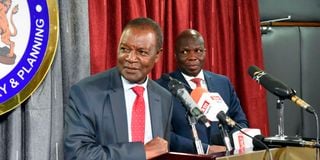Premium
Ruto’s headache in bid to raise revenues to Sh3trn

National Treasury Cabinet Secretary Njuguna Ndung’u with Economic Planning Principal Secretary James Muhati during a media briefing on December 6.
President William Ruto faces hurdles to achieve some ambitious targets he has in setting ground to fulfil key promises to the people, while balancing them with a shift from overreliance on debt.
In a move propped as what will take Kenya to a self-reliance position insofar as development is concerned, President Ruto wants the Kenya Revenue Authority (KRA) to grow revenues by about half to Sh3 trillion by the next financial year.
During the KRA’s taxpayer day event last month, the President was adamant that the taxman must expand the tax base by ensuring every eligible taxpayer is brought on board to pay their due share, while also directing KRA to double current collections in five years.
“Our GDP has risen to Sh12 trillion yet KRA only raised about 14 per cent of GDP in revenues last year. In the past, KRA was able to raise 18 per cent of GDP. If we collect the same target today, then we would have raised an extra Sh400 billion.
“In that case, I expect KRA to raise at least Sh3 trillion by the end of the next financial year and to double the current collection in five years,” President Ruto stated.
He declared that his government will prioritise taxing wealth, consumption, income and trade, in that order.
While KRA’s revenues have been on an upward trajectory since 2020, Dr Ruto still termed the current collections unsatisfactory and indicated that the lack of adequate resources had prevented delivery of critical projects.
“The implementation of our government’s plan for rapid and inclusive socioeconomic transformation of our country depends on a robust revenue growth rate and a well-managed budget deficit,” he said.
The President insists that the taxman must expand taxpayer numbers and that no single taxpayer should be left out, his push coming in sync with the International Monetary Fund (IMF) which has been insisting on the need for Kenya to grow her tax base, to support government services and lower debt burden.
Recognising that strong revenue performance cushioned the initial impact of global shocks on households and businesses, the IMF called on Kenya to continue with its fiscal consolidation journey while implementing more tax measures.
“Looking ahead, continued strong commitment to fiscal consolidation over the medium term remains key to reduce debt vulnerabilities. Additional tax policy measures, anchored in a Medium-Term Revenue Strategy to secure space for needed social and development spending, and improved spending efficiency, revenue administration, and public financial and debt management will be key,” said Ms Antoinette Sayeh, Deputy Managing Director and Acting Chair at the IMF, in a press release on Monday following the latest release of Sh55 billion under the 38-month programme with Kenya.
Also Read: KRA five-month revenue collection up 10pc
The push by President Ruto and the IMF, however, face trying times ahead with the new administration castigating KRA’s overzealous revenue collection strategies that it has likened to extortion, which the taxman used to grow revenues.
Through heavy investment in high-tech intelligence and other revenue systems, KRA in 2021/22 grew its revenues by nearly 22 per cent to collect Sh2.031 trillion.
This had come from a collection of Sh1.669 trillion in 2020/21, which was a 3.9 per cent growth from the Sh1.607 trillion collected in 2019/20.
The government wants KRA to grow the Sh2.031 trillion revenues to Sh3 trillion (a 48 per cent growth) by June 2024, while approaching taxpayers with care and without harassment, a strategy not yet clear how it will pan out.
President Ruto has also promised to grow remittances up to Sh1 trillion. “The data on remittances is an object of deep fascination, and not just because we are proud of the Kenyan Diaspora for remitting over Sh400 billion annually.
Remittances are also a reliable indicator of the value of professional contribution and impact of the knowledge, skill and passion of Kenyans abroad,” the President said.





